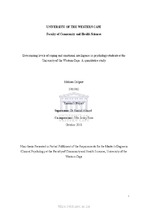| dc.description.abstract | Literature on the experiences of psychology students is limited, particularly in the South African context of previously disadvantaged institutions. More specifically, not much is known about levels of emotional intelligence (EI) and coping during higher education training. Successful academic performance depends on adherence to EI criteria, including accurate acknowledgement of, and responses to emotions in others, efficiently negotiating relationships and directing one’s motivations towards explicit goals. Coping refers to the constantly changing cognitive and behavioural responses that attempt to manage internal and/or external stressors. This study aimed to understand the relationship between emotional intelligence and coping, and tested the hypothesis that higher levels of emotional intelligence will be associated with higher levels of coping. It adopted a quantitative approach with a cross-sectional survey research design. The sample included 114 students who were enrolled in the psychology third- year and honours programmes at the University of the Western Cape at the time of the study. A purposive, convenience sampling method was used, and data was collected using a self- constructed demographic questionnaire (DQ), the Assessing Emotions Scale (AES), and the Ways of Coping Scale (WOCS). The Statistical Software Package for the Social Sciences (SPSS) was used to analyse the data. Correlational analysis of variance (ANOVA) and multivariate analysis of variance (MANOVA) were applied. Ethical stipulations included that participation was voluntary, the identity of respondents was kept anonymous, and confidentiality was respected.
The findings indicated that there was no significant relationship between EI and coping. Conversely, it was found that students who worked while studying displayed increased levels of EI, and those who intended to further their studies on master’s level, utilised higher-level coping strategies. Recommendations are therefore that further studies include actual measured abilities to complement the self-report instrument used in this study. | en_US |

